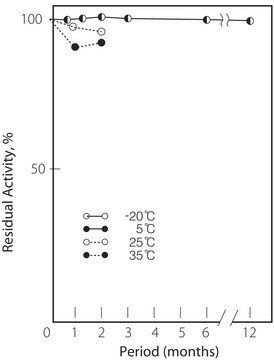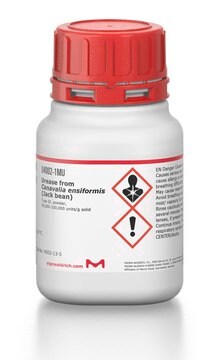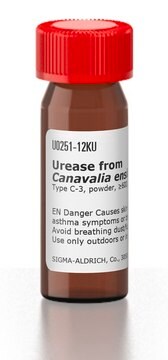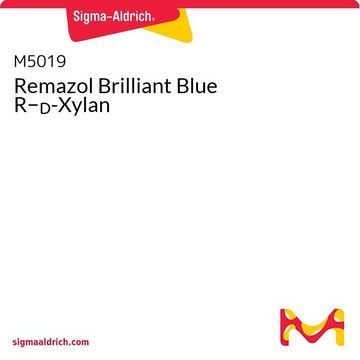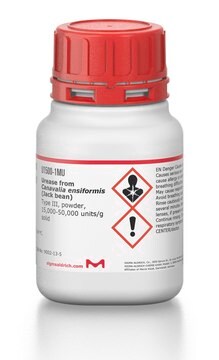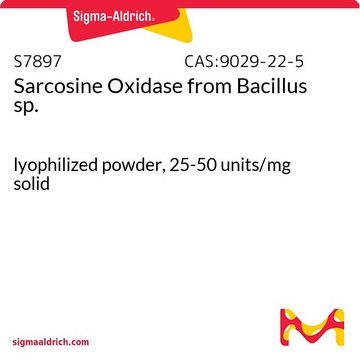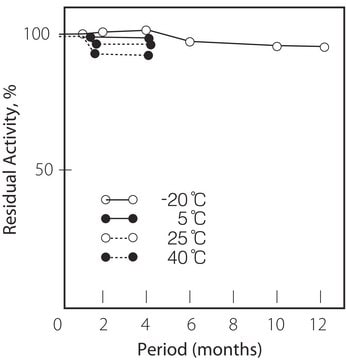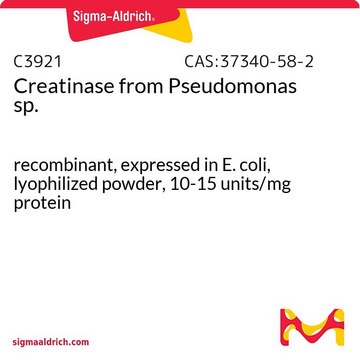Alle Fotos(5)
Wichtige Dokumente
C9409
Creatinine Deiminase microbial
lyophilized powder, ≥25 units/mg protein
Synonym(e):
Creatinine Deaminase
Anmeldenzur Ansicht organisationsspezifischer und vertraglich vereinbarter Preise
Alle Fotos(5)
About This Item
CAS-Nummer:
EG-Nummer:
MDL-Nummer:
UNSPSC-Code:
12352204
NACRES:
NA.54
Empfohlene Produkte
Form
lyophilized powder
Qualitätsniveau
Spezifische Aktivität
≥25 units/mg protein
Mol-Gew.
~260 kDa
Zusammensetzung
Protein, ≥15% biuret
Lagertemp.
−20°C
Anwendung
Creatinine Deiminase microbial has been used:
- to immobilize aminosilylated glass beads based biosensor for ammonia/ammonium and creatinine detection in urine
- in creating creatinine-sensing membrane for biophysical studies
- to investigate the bioelectronic tongue for the simultaneous determination of urea, creatinine and alkaline ions in clinical samples
Creatinine deiminase has been used in a study to assess the application of a creatinine-sensitive biosensor for hemodialysis control. Creatinine deiminase has also been used in a study to investigate the bioelectronic tongue for the simultaneous determination of urea, creatinine and alkaline ions in clinical samples.
Biochem./physiol. Wirkung
Creatinine deiminase catalyzes the hydrolysis of creatinine to methylhydantoine and ammonia.
Physikalische Eigenschaften
Isoelectric point : 4.4
Michaelis constant : 3.5 x 10‾3M (Creatinine)
Structure : 6 subunits per mol of enzyme
Inhibitors : Ag+,Hg++, o-phenanthroline,monoiodoacetate
Optimum pH : 8.5 – 9.5
Optimum temperature : 65 – 75°C
pH Stability : pH 7.0 – 11.0 (30°C, 20hr)
Thermal stability : Below 65°C (pH 7.5, 1hr)
Michaelis constant : 3.5 x 10‾3M (Creatinine)
Structure : 6 subunits per mol of enzyme
Inhibitors : Ag+,Hg++, o-phenanthroline,monoiodoacetate
Optimum pH : 8.5 – 9.5
Optimum temperature : 65 – 75°C
pH Stability : pH 7.0 – 11.0 (30°C, 20hr)
Thermal stability : Below 65°C (pH 7.5, 1hr)
Einheitendefinition
One unit will hydrolyze 1.0 μmole of creatinine to N-methylhydantoin and NH3 per min at pH 7.5 at 37 °C in a coupled system with L-glutamic dehydrogenase.
Physikalische Form
Lyophilized powder containing mannitol as stabilizer
Lagerklassenschlüssel
11 - Combustible Solids
WGK
WGK 3
Flammpunkt (°F)
Not applicable
Flammpunkt (°C)
Not applicable
Persönliche Schutzausrüstung
Eyeshields, Gloves, type N95 (US)
Analysenzertifikate (COA)
Suchen Sie nach Analysenzertifikate (COA), indem Sie die Lot-/Chargennummer des Produkts eingeben. Lot- und Chargennummern sind auf dem Produktetikett hinter den Wörtern ‘Lot’ oder ‘Batch’ (Lot oder Charge) zu finden.
Besitzen Sie dieses Produkt bereits?
In der Dokumentenbibliothek finden Sie die Dokumentation zu den Produkten, die Sie kürzlich erworben haben.
Anne K Bendt et al.
Archives of microbiology, 181(6), 443-450 (2004-05-19)
In order to utilize different nitrogen sources and to survive situations of nitrogen limitation, microorganisms have developed several mechanisms to adapt their metabolism to changes in the nitrogen supply. In this communication, the use of creatinine as an alternative nitrogen
Hybrid biosensors for clinical analysis and fermentation control.
I Karube
Methods in enzymology, 137, 131-138 (1988-01-01)
T W Esders et al.
The Journal of biological chemistry, 260(7), 3915-3922 (1985-04-10)
Creatinine iminohydrolase (EC 3.5.4.21), which catalyzes hydrolysis of creatinine to N-methylhydantoin and ammonia, was purified from Flavobacterium filamentosum. The average molecular weight of the purified enzyme was 272,480, and the subunit molecular weight was 44,300. Extensive specificity studies indicated that
[Immobilized enzyme reactors--their use in chemiluminescence detection].
M Tabata et al.
Tanpakushitsu kakusan koso. Protein, nucleic acid, enzyme, 31(3), 220-229 (1986-03-01)
Hsiao-Chung Tsai et al.
Analytical biochemistry, 334(1), 183-192 (2004-10-07)
An optical array biosensor encapsulated with hydrolase and oxidoreductase using sol-gel immobilization technique has been fabricated for simultaneous analysis and screening of multiple samples to determine the presence of multianalytes which are clinically important in relation to renal failure. Urease
Unser Team von Wissenschaftlern verfügt über Erfahrung in allen Forschungsbereichen einschließlich Life Science, Materialwissenschaften, chemischer Synthese, Chromatographie, Analytik und vielen mehr..
Setzen Sie sich mit dem technischen Dienst in Verbindung.